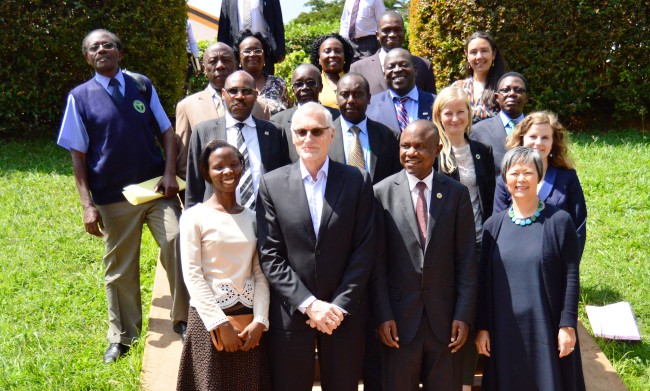The Director General of the Norwegian Agency for Development Cooperation (NORAD), Jon Lomøy has applauded Makerere University for maintaining strong ancient ties with the Royal Government of Norway as well as the Norwegian institutions through the Norwegian support, partnerships, research, innovations, knowledge sharing, and student-staff exchange. This was during his visit to the great institution on 21st November 2017.
The Director General, who was accompanied by the Norwegian Ambassador to Uganda, H.E Susan Eckey, and other delegates namely Marte Tokenaes, Tina Holtgaard Oulie, Jeanette Da Silva and Mary Mabweijano, referred to Makerere University as the hub of Norwegian cooperation in Uganda.
“I am impressed with the long term cooperation that is dated way back in the 1940s! We are happy to note that Norway has had a strong hand in the physical and academic developments of Makerere University. And we are glad to be partners during the time when Makerere University is achieving a lot in her diverse work,” he said.

Meeting the Makerere University Central Management, the Principal Investigators of Capacity Building in Higher Education and Research for Development (NORHED) Projects and a team from Institutional Development and Implementation Committee (NIDIC), the Director General extended his sincere gratitude to the Makerere University Management and the entire University community for their strong contribution towards research and human resources through capacity building programmes.
“Our major focus is to strengthen the institutional capacity and performance of higher education institutions (HEIs). I therefore recognise Makerere University’s efforts in enforcing capacity building programs in Uganda as well as leading the country in research developments,” he said.
Jon Lomøy is looking towards a sustainable cooperation between Makerere University and the Royal Government of Norway even at a time when Uganda becomes financially independent. “We should have a continued scientific collaboration in research and innovations. Makerere University is one of the major hope in the Norwegian collaboration and Uganda is the major recipient of the Norwegian support, therefore we should not break this strong ties we have built over decades,” said the Director General.

The Ambassador of Norway to Uganda H.E Susan Eckey appreciated the institutions efforts to continue developing projects and initiatives under the NORAD support. “I am pleased to know that Makerere University is expanding the School of Women and Gender Studies, initiated by Norwegian collaboration with Makerere University,” she said.
In a speech read by Dr. Eria Hisali, the Acting Deputy Vice Chancellor for Finance and Administration, the Vice Chancellor Prof. Barnabas Nawangwe acknowledged Norway’s contribution towards transforming Makerere University in the areas of teaching and learning, research and innovation, knowledge transfer partnerships and networking. “With this collaboration we have not only developed in academics, physical infrastructures and expanding of the human resource capacity through training, but we have also improved in the area of poverty reduction,” said the Vice Chancellor.
He thanked the Royal Government of Norway, the Norwegian Institutions for prioritising Makerere University when securing research and support grants. “We have been on the fore front in winning these grants, we have implemented many of the Norwegian projects and the current one is the NORHED where Makerere University is implementing 9 out of the 13 projects. We are really grateful for this consideration and this partly explains why we rank as one of the best 10 universities in Africa,” he mentioned.

In an overview on “Government of the Royal Kingdom of Norway” support to Makerere University and 70 years Institutional collaboration between Makerere University and the Norwegian Institutions” the Director, Planning & Development Department Dr. Florence Nakayiwa highlighted the achievements of the collaborations, the different research projects at Makerere University supported by NORAD and other potential areas of support towards institutional development.
Amidst applause from the congregation, Dr. Hisali presented an admirably befitting Plaque to the Director General and the entire NORAD team, on behalf of the Vice Chancellor as a sign of appreciation for their invaluable contribution towards Makerere University’s transformation in the area of teaching and learning, research and innovations, knowledge transfer partnerships and infrastructure development. He also presented Makerere University Souvenirs to the delegates.
Article by Public Relations Office


 General2 weeks ago
General2 weeks ago
 Agriculture & Environment2 weeks ago
Agriculture & Environment2 weeks ago
 General1 week ago
General1 week ago
 Health2 weeks ago
Health2 weeks ago
 Research2 weeks ago
Research2 weeks ago





